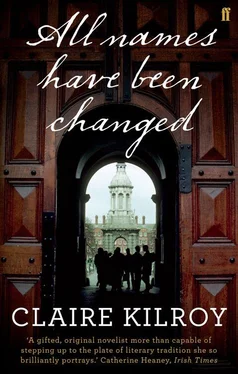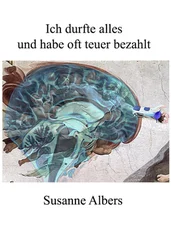Claire Kilroy - All Names Have Been Changed
Здесь есть возможность читать онлайн «Claire Kilroy - All Names Have Been Changed» весь текст электронной книги совершенно бесплатно (целиком полную версию без сокращений). В некоторых случаях можно слушать аудио, скачать через торрент в формате fb2 и присутствует краткое содержание. Год выпуска: 2010, Издательство: Faber & Faber, Жанр: Современная проза, на английском языке. Описание произведения, (предисловие) а так же отзывы посетителей доступны на портале библиотеки ЛибКат.
- Название:All Names Have Been Changed
- Автор:
- Издательство:Faber & Faber
- Жанр:
- Год:2010
- ISBN:нет данных
- Рейтинг книги:5 / 5. Голосов: 1
-
Избранное:Добавить в избранное
- Отзывы:
-
Ваша оценка:
- 100
- 1
- 2
- 3
- 4
- 5
All Names Have Been Changed: краткое содержание, описание и аннотация
Предлагаем к чтению аннотацию, описание, краткое содержание или предисловие (зависит от того, что написал сам автор книги «All Names Have Been Changed»). Если вы не нашли необходимую информацию о книге — напишите в комментариях, мы постараемся отыскать её.
All Names Have Been Changed — читать онлайн бесплатно полную книгу (весь текст) целиком
Ниже представлен текст книги, разбитый по страницам. Система сохранения места последней прочитанной страницы, позволяет с удобством читать онлайн бесплатно книгу «All Names Have Been Changed», без необходимости каждый раз заново искать на чём Вы остановились. Поставьте закладку, и сможете в любой момент перейти на страницу, на которой закончили чтение.
Интервал:
Закладка:
‘I have no idea where these roads are. There is nothing familiar about them. They are not within the environs of my home. Sometimes it is a rural landscape, other times suburban. Occasionally the region doesn’t look Irish at all, but vaguely Soviet in character, some deserted province I must have seen in a documentary. These fragments don’t present themselves in a chronological sequence, and are not linked to any particular person or event. If I could manage to glance down to see what I am wearing, there’s some chance I might be able to connect the journey to a specific occasion. A hospital visit, a funeral, something grim like that. But I can’t glance down. It is impossible to move my head. I’ve been staring out the passenger window for so long that my neck has set.
‘All that remains of my twenties and thirties are these puzzling oddments, these disconnected recollections of staggered junctions, derelict outhouses, oppressive tunnels, road kill of indeterminate species. These fragments loom up at me without warning at any time of the day or night — at least three of them this morning alone. I am never safe from them. I could be making the bed or reading a book when, out of nowhere, I am confronted with a desolate road at twilight. These images leave me with a sense of profound emptiness, close to nausea in quality. There seems no end to the store stockpiled in my head. This is the mind I have been left with.
‘Do you see?’ she asked, suddenly addressing us, but thankfully not waiting for an answer. ‘I have come to regard these snatches of roads as flashbacks from a kidnapping. The man in the driver’s seat is my abductor. I was not, of course, abducted. It is merely how I’ve learned to interpret these images. The girl I used to be was bundled into a car and whipped away from her life. I am the changeling who took her place. She transmits these messages to remind me she’s still out there.
‘And now I find I am disappointed. I am a disappointed woman. What will sustain me through the long years ahead? The only good to be derived is that twenty years of this is enough to demonstrate the necessity to stop. It is time to plug the dam of wasted days. So, here I am.’ She shrugged.
It appeared to be darker in the workshop when Antonia had finished speaking. Residues of her dusk roads had invaded the room, draining the colour from things, extinguishing the warmth. We saw them in our minds’ eyes — her wretched thorny hedgerows snagged with shreds of plastic bags, her stagnant brown ditchwater, her rapidly dimming skies.
Antonia looked around calmly for a response, but got none. There was nothing to be said. What, I wonder, had she expected from us? We were so much younger than her. What did we know? She had moved beyond our frame of reference. However, she instilled an awareness that what had happened to her could as easily happen to one of us if we did not lead our lives with due vigilance, though to play that cautionary role was not what she had come for.
‘I hate the word “journey”,’ Antonia concluded, and Glynn nodded. He nodded for a long time, apparently knowing what all this meant.
The second he was gone, Antonia began to tremble. Her lips turned purple as she shook with rage. ‘Effing bastard,’ she hissed, ‘trying to demean us like that. Who the hell does he think he is?’ A bubble of anxiety formed in the pit of my stomach. There was something about a grown woman’s rage that I could not begin to cope with. Glynn would have been horrified too. He might have acted with a little circumspection had he witnessed her in that state, had he apprehended her terrifying volatility.
The three girls, naturally, knew exactly what to do. They sprang into action and were making soothing noises, stroking her arms, smoothing her hair, as I found myself being propelled out of that room with a velocity that I can only excuse as involuntary.
8 Strumpet City
I got nothing written in the library after that first workshop. I couldn’t concentrate on the page. A whole two words I managed to beat out during the long hours I sat in the chair: ‘bearing’ and ‘virtue’. I keep the scrap of paper still. They weren’t words I’d resorted to in the past, being terms from a different era, essentially, the courtly love period, perhaps. I am no authority.
Both were an attempt to evoke the same subject: Guinevere. The dullest throb of a notion had begun to form in my mind, innocently enough at first, and so inappreciable that it was months before I saw what I was up to, and months again before I admitted to it: that if I observed Guinevere, if I studied Guinevere, if I seized upon Guinevere, I would be able to write. As it so happened, I was not alone in formulating this plan.
I took down the library reference copy of Glynn’s Farm Animals , a novel which, according to Dr M. J. Hanratty’s breeze block of a biography, was originally submitted under the title Apophthegm . In light of the substantial length of this, Glynn’s seventh novel (even with a dense word-per-page ratio, it ran to some seven hundred and seventy-two pages), the title was presumably employed in an ironic capacity. His publishers, whilst acknowledging the formidable power and importance of the work, and asserting their ongoing and unwavering support for Glynn’s career, declined to publish the novel under that title, arguing that readers would be alienated by the use of a word they didn’t understand, let alone know how to pronounce. ‘An overabundance of consonants, Patrick,’ Tobias Sweetman, the highly respected editor-in-chief of Prior Press, is reported to have told Glynn at a lunch held in Bloomsbury in the writer’s honour. We can only imagine the alcohol-fuelled reaction. Glynn’s artistic judgement had never been queried before.
When Apophthegm was politely but firmly ruled out by Prior Press as a title, Glynn’s response was characteristically uncooperative. He submitted Homophone as an alternative option, followed by Uaigneas , then Ocras , the first two Irish words to enter his head, endeavouring to force Tobias to concede to his original choice. At least he’d addressed the preponderance-of-consonants issue, not that anyone thanked him.
Tobias, a fair man, and acting solely in Glynn’s interest — a writer needs readers, after all, whether he likes it or not — didn’t concede, and the novel was published in the summer of 1977 under the title Farm Animals , a ‘last ditch compromise with which nether [sic] party was happy’ (Hanratty, p. 655). Glynn’s subsequent polemic, ‘The Death of Art,’ which appeared in the Times Literary Supplement (24 June 1977, p. 762) to coincide with the publication of Farm Animals , depicted Western culture as a steadily evaporating pond in a vast featureless desert in which words and concepts not instantly grasped by the masses (or ‘pond life,’ as he unhelpfully termed them) were pitched out onto the sun-cracked banks to thrash about and die.
The essay was similarly scathing in its criticism of a thinly veiled Tobias Sweetman, pillorying him as ‘cowardly’, ‘womanish’ (Glynn’s lowest term of abuse) and ‘woolly-headed’, epithets which, by all accounts, were wildly undeserved. Glynn had committed the mortal sin of allowing his vicious streak to enter the public domain. Didn’t he know they’d be waiting for him in the long grass? Didn’t he care?
‘It is doubtless that many authors have a nasty side,’ noted the books columnist in the Sunday Times , ‘but few display it so cheerfully.’ ‘Farm animal indeed,’ remarked the Observer . Sweetman declined to comment on the matter.
Glynn’s unprovoked attack marked the end of what had been a fruitful editorial relationship lasting some twenty-two years. Within eighteen months Sweetman was dead, and the general sentiment amongst the London publishing fraternity, according to Dr Hanratty’s presumably authoritative sources, was that the Irishman had hastened the Englishman’s end, a charge to which Glynn responded — when it was put to him in an interview in those blunt terms — ‘Oh, so it’s political now, is it?’ The Troubles in Northern Ireland were at fever pitch. Glynn terminated the interview and left. Sweetman, it should be noted, had suffered an aneurysm, for which Glynn could hardly be held accountable.
Читать дальшеИнтервал:
Закладка:
Похожие книги на «All Names Have Been Changed»
Представляем Вашему вниманию похожие книги на «All Names Have Been Changed» списком для выбора. Мы отобрали схожую по названию и смыслу литературу в надежде предоставить читателям больше вариантов отыскать новые, интересные, ещё непрочитанные произведения.
Обсуждение, отзывы о книге «All Names Have Been Changed» и просто собственные мнения читателей. Оставьте ваши комментарии, напишите, что Вы думаете о произведении, его смысле или главных героях. Укажите что конкретно понравилось, а что нет, и почему Вы так считаете.












